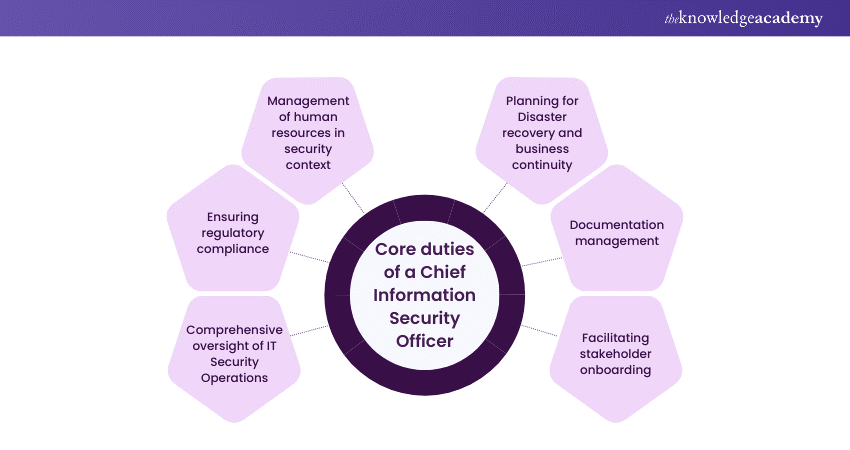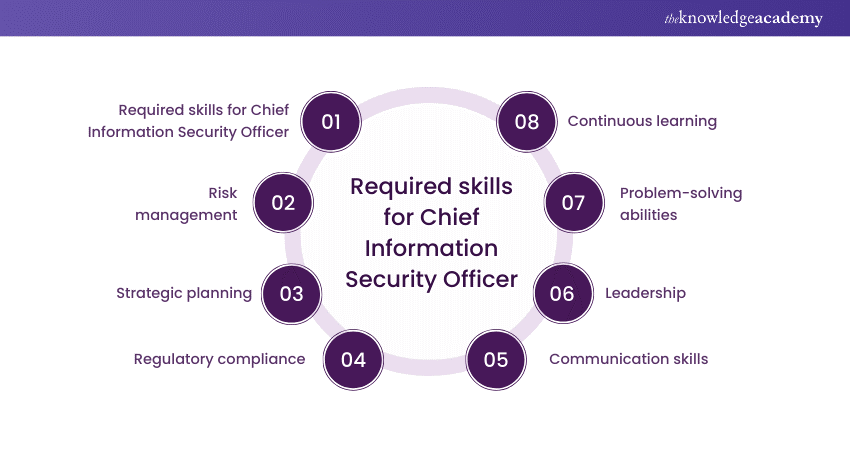We may not have the course you’re looking for. If you enquire or give us a call on +420 210012971 and speak to our training experts, we may still be able to help with your training requirements.
Training Outcomes Within Your Budget!
We ensure quality, budget-alignment, and timely delivery by our expert instructors.

Chief Information Security Officers has become paramount for organisations in today's digitally driven world. They act like a key guardian who stands vigilant against the ceaseless tide of cyber threats.
This role is not just about overseeing security protocols but about strategising a defence that evolves with plenty of new challenges. In this blog, we will uncover who is a Chief Information Security Officer, their multifaceted responsibilities, the path to becoming a CISO, etc.
Table of Content
1) Who is a Chief Information Security Officer?
2) Core duties of a Chief Information Security Officer
3) Required skills for Chief Information Security Officer
4) Job description of CISO
5) CISO salary
6) How to become a Chief Information Security Officer?
7) Conclusion
Who is a Chief Information Security Officer?
The CISO is the senior-level executive within an organisation. These individuals are responsible for developing, implementing, and overseeing the organisation's Information Security initiative. Their major goal is to safeguard the digital assets of an organisation, including sensitive data, networks, and systems from cyber-attacks. Their job role includes strategic planning, Risk Management, and aligning the Information Security initiative with the organisation's goals and objectives.
The CISO also plays a vital role in disaster recovery and the continuity planning of a business. It ensures that the organisation can continue to operate or quickly resume critical operations in the event of an incident or disaster. Therefore, this role demands good expertise in Cyber Security, business acumen, and leadership to navigate the complex landscape of digital threats. Now that you know about “who is a Chief Information Security Officer?”, let’s learn about their core duties.
Core duties of a Chief Information Security Officer
As the guardian of digital assets, CISO shoulders numerous responsibilities. Here, we delve into the pivotal tasks that define the role and significance of a CISO within an organisation.

1) Comprehensive oversight of IT Security Operations
The CISO is the captain of the ship when it comes to ensuring the security of an organisation's IT infrastructure. They oversee the day-to-day operations of the IT Security team, ensuring that systems, networks, and data are protected from potential threats. This involves implementing security measures, monitoring for vulnerabilities, and responding swiftly to any security incidents that may arise.
2) Ensuring regulatory compliance
In a world where rules and standards keep changing, the CISO is like a guide, making sure the organisation follows all the necessary requirements. This involves staying abreast of relevant laws and regulations. They also implement policies and procedures to ensure compliance and regularly audit and assess the organisation's adherence to these standards.
3) Management of Human Resources in the security context
The CISO is responsible for the technical aspects of security and managing the Human Resources department dedicated to safeguarding the organisation. This includes hiring and training security personnel and defining roles and responsibilities within the security team. They also foster a culture of security awareness throughout the company.
4) Planning for disaster recovery and business continuity
Disasters can strike at any moment, whether it be a cyber-attack, natural disaster, or unforeseen technical failure. The CISO is tasked with developing and maintaining comprehensive plans for disaster recovery and business continuity. It ensures that the organisation can swiftly recover and resume regular operations in the event of a disruption.
5) Documentation management
Documentation is important in Cyber Security. The CISO oversees the creation, maintenance, and enforcement of policies, procedures, and documentation related to Information Security. This includes incident response plans, security protocols, and compliance documentation. It serves as a crucial resource for guiding security practices and demonstrating regulatory compliance.
Manage the Information Security of your company with our Information Systems Security Management Training - sign up now!
6) Facilitating stakeholder onboarding
Effective security extends beyond the IT department. It involves the participation and cooperation of stakeholders throughout the company. The CISO plays a key role in facilitating the onboarding of stakeholders, including employees, partners, and vendors. They ensure that the stakeholders understand their roles and responsibilities in maintaining the company’s security posture. This involves providing training, resources, and assistance to ensure that all stakeholders are equipped to contribute to a secure environment.
Required skills for Chief Information Security Officer
Achieving success as a Chief Information Security Officer (CISO) demands a distinctive mix of technical prowess, strategic acumen, and strong leadership skills. Here are the key skills essential for excelling in this crucial role:

1) Technical proficiency
A strong foundation in Information Security principles, technologies, and practices is essential. CISOs must understand the intricacies of Cyber Security systems, encryption methods, network protocols, and emerging threats.
2) Risk Management
CISOs must possess excellent risk assessment and management skills. This involves identifying potential security risks, evaluating their potential impact on the organisation, and implementing strategies to mitigate or eliminate these risks.
3) Strategic planning
CISOs play a strategic role in aligning security initiatives with the organisation's overall goals and objectives. They must be adept at developing long-term security strategies that support business growth while effectively managing resources and budget constraints.
4) Regulatory compliance
Staying abreast of relevant laws, regulations, and industry standards is crucial for CISOs. They must ensure that the organisation remains compliant with all applicable security and privacy regulations, such as GDPR, HIPAA, or PCI-DSS.
5) Communication skills
CISOs must be effective communicators, capable of translating technical jargon into layman's terms for non-technical stakeholders. They must also be skilled at conveying the importance of security measures and gaining buy-in from senior management and other departments.
6) Leadership
As leaders of the security team, CISOs must inspire and motivate the members in the team to excel in their roles. Strong leadership qualities, such as decisiveness, integrity, and empathy, are essential for fostering a positive and productive work environment.
7) Problem-solving abilities
Cyber Security threats are constantly evolving, requiring CISOs to have adept Problem-Solving abilities. They must be able to analyse complex security incidents, identify root causes, and develop effective solutions to mitigate future risks.
8) Continuous learning
To stay ahead in the field, CISOs should prioritise ongoing learning and development. This involves keeping abreast of the newest security trends, technologies, and best practices, ensuring they remain well-equipped to tackle evolving Cyber Security challenges.
By cultivating and honing these essential skills, aspiring CISOs can position themselves for success in this critical role and make significant contributions to their organisation's security posture and overall success.
Job description of CISO
Here is the sample example for the CISO job description
|
Chief Information Security Officer*- job post XYZ Warrington Temporary contract Job details Here’s how the job details align with your profile. Job type Temporary contract Location Warrington Benefits Pulled from the full job description Company pension Full job description Salary Secondment Opportunity Location Warrington This is a temporary, full-time vacancy. The vacancy Chief Information Security Officer - Secondment Opportunity What is the key purpose of this role? Job Purpose Carry out the role of Chief Information Security Officer (CISO) for NTS. Responsible for leading and developing the team to deliver Cyber Security, Information Security, data protection and records management and knowledge management arrangements for NTS. Responsible for the management of regulatory compliance with all applicable national regulations/requirements, including managing the interface with ONR – CNS, Dept for Transport (DfT) (Cyber and Information Security teams), and other key organisations involved in the provision of cyber and Information Security arrangements in support of NTS global operations. To support the Coordination Lead (SAR & ICT) in the leadership and management of the function and to contribute to the success of NTS through wider Senior Management engagement. What are the key deliverables and accountabilities of the role? Key expectations of the job holder 1) Support the development of and accountability for the implementation of an efficient information governance, cyber, and information security strategy. 2) Lead all Cyber Security arrangements. 3) Lead all Information Security arrangements. 4) Lead all records management arrangements. 5) Act as Information Governance Officer (IGO) and Cryptographic Communications Security Officer (ComSO) for NTS 6) Primary company interface with UK security regulators for cyber and Information Security and other regulators, including international, in support of NTS global operations 7) Formulate policy on information and personnel security in classified contracts, including liaison with the procurement team. 8) Manage and lead the provision of cyber and Information Security advice for new NTS business activities and projects. 9) Reporting and investigation of cyber and Information Security incidents 10) Management of the cyber and Information Security budget and risk registers 11) Provide expert input into and deliver the SAR consultancy initiative as appropriate. Seek new opportunities for NTS benefit. 12) Arrange team attendance and input into project meetings. 13) Represent NTS at national and international security and information governance forums. 14) Supports, delivers and develops security training as required. 15) Supports the company’s development of the overall strategy and culture 16) Manage your own workload, including time and deadline management. 17) Manage your own performance, including self-development 18) Manage health and well-being. 19) Undertake other activities commensurate with their skills and experience as and when required. If you would like to see the full role profile, please visit the bottom of the page. What are the benefits of working at NTS? Here are the benefits of working at NTS: 1) Diversity and inclusion 2) Active & vibrant staff networks 3) Special leave policies 4) Accommodating workplace for people with special needs 5) Enhance your potential at all levels The company We are one of the leading global providers of safe, reliable and secure nuclear transport solutions. We support the largest environmental restoration initiative in Europe. Additionally, we use our expert transport and logistics proficiency to help customers and partners around the world solve their own complex challenges. Benefits 1) Attractive salary 2) Fantastic pension scheme 3) Training and development 4) Generous leave entitlements 5) Flexible working 6) Healthcare scheme |
CISO salary
Chief Information Security Officers' compensation fluctuates depending on factors like experience, industry, and location. Here's a breakdown of average annual salaries across different countries.
|
Countries |
Salary |
|
UK |
£ 98,840 |
|
USA |
$1,09,573 |
|
India |
₹63,00,000 |
|
UAE |
AED 1,70,397 |
|
Canada |
CA$91,099 |
|
Australia |
AU$2,15,025 |
|
Singapore |
SGD 3,63,071 |
Source: Glassdoor
How to become a Chief Information Security Officer?
Becoming a Chief Information Security Officer (CISO) isn't merely about climbing the corporate ladder; it's a strategic journey that requires a blend of education, experience, and continuous development. Here's a roadmap to guide aspiring individuals on their quest to assume this pivotal role:
1) Cultivate a strong educational foundation
Begin your journey by pursuing a relevant bachelor's degree in fields like information technology, computer science, or a related area of study. Advanced degrees like master's or doctoral courses can provide a competitive edge, offering specialised knowledge and expertise.
2) Gain practical experience
Transitioning from theory to practice is vital in the Cyber Security realm. Seek entry-level positions in IT or Cyber Security to gain hands-on experience. Roles like Network Administrator, Security Analyst, or IT Auditor can provide valuable insights into the operational aspects of Cyber Security.
3) Obtain relevant certifications
Certifications validate your expertise and proficiency in Cyber Security. Consider pursuing credentials like Certified Information Security Manager (CISM), Certified Ethical Hacker (CEH) or Certified Information Systems Security Professional (CISSP) to bolster your skills and credibility.
4) Develop leadership skills
Effective leadership is paramount for a CISO. Hone your leadership abilities by taking on roles with increasing responsibilities, participating in leadership development initiatives, and seeking mentorship from seasoned professionals in the field.
Want to become a Chief Information Security Officer and protect your business from cyber-attacks? - Register for our Chief Information Security Officer Training now!
5) Stay abreast of industry trends
The Cyber Security landscape is dynamic, with new threats and technologies emerging regularly. Keep up to date by staying informed about industry trends, best practices, and regulatory demands. Engage in continuous learning, attend conferences, and participate in professional networks to stay ahead of the curve.
6) Build a professional network
Networking is crucial for career growth. Attend industry events, join esteemed professional organisations such as the Information Systems Security Association (ISSA) or the International Association of Privacy Professionals (IAPP), and actively connect with peers and mentors. Building a strong professional network leads to numerous opportunities and fosters continuous growth in your career journey.
7) Demonstrate strategic vision
Aspire to become not just a technical expert but a strategic leader capable of aligning Cyber Security initiatives with organisational objectives. Showcase your ability to articulate the business impact of Cyber Security decisions and develop comprehensive security strategies that mitigate risks effectively.
8) Pursue continuous learning and development
The journey to becoming a CISO is ongoing. Prioritise continuous learning and professional development to stay ahead of evolving threats and technologies. Pursue advanced training, engage in workshops, and seize opportunities for advancement within your organisation. With a dedication to excellence, aspiring individuals can confidently progress towards assuming the esteemed role of Chief Information Security Officer.
By following these steps and maintaining a steadfast commitment to excellence, aspiring individuals can navigate the path towards assuming the esteemed role of Chief Information Security Officer.
Conclusion
The journey to becoming a Chief Information Security Officer is both challenging and rewarding. It is not just a position but a mission to make the digital world a safer place for all. Individuals in this industry safeguard an organisation's digital assets against internal and external threats. Therefore, with the right skills, experience, and determination, the path to becoming a CISO can lead to a fulfilling career opportunity in Cyber Security.
Do you want to be a Certified Information Systems Security Professional? Register for our CISSP-ISSAP Training & Certification Course.
Frequently Asked Questions

The biggest concerns of a CISO include safeguarding sensitive data from cyber threats, ensuring regulatory compliance, managing security risks, and maintaining the organisation's reputation.

For a CISO to effectively handle cybersecurity, they must be knowledgeable about cybersecurity principles, new threats, rules they need to follow, ways to manage risks, and how to communicate well to work with others and reduce security risks.

The Knowledge Academy takes global learning to new heights, offering over 30,000 online courses across 490+ locations in 220 countries. This expansive reach ensures accessibility and convenience for learners worldwide.
Alongside our diverse Online Course Catalogue, encompassing 17 major categories, we go the extra mile by providing a plethora of free educational Online Resources like News updates, Blogs, videos, webinars, and interview questions. Tailoring learning experiences further, professionals can maximise value with customisable Course Bundles of TKA.

The Knowledge Academy’s Knowledge Pass, a prepaid voucher, adds another layer of flexibility, allowing course bookings over a 12-month period. Join us on a journey where education knows no bounds.

The Knowledge Academy offers various CISSP Courses, including Information system security management and Chief Information Security Officer Training Courses. These courses cater to different skill levels, providing comprehensive insights into Information Security.
Our IT Security & Data Protection cover a range of topics related to Cyber Security, offering valuable resources, best practices, and industry insights. Whether you are a beginner or looking to advance your Cyber Security skills, The Knowledge Academy's diverse courses and informative blogs have you covered.
Upcoming IT Security & Data Protection Resources Batches & Dates
Date
 CISSP Certification
CISSP Certification
Mon 13th Jan 2025
Mon 10th Feb 2025
Mon 10th Mar 2025
Mon 7th Apr 2025
Mon 12th May 2025
Mon 9th Jun 2025
Mon 14th Jul 2025
Mon 11th Aug 2025
Mon 8th Sep 2025
Mon 13th Oct 2025
Mon 10th Nov 2025
Mon 8th Dec 2025







 Top Rated Course
Top Rated Course



 If you wish to make any changes to your course, please
If you wish to make any changes to your course, please


